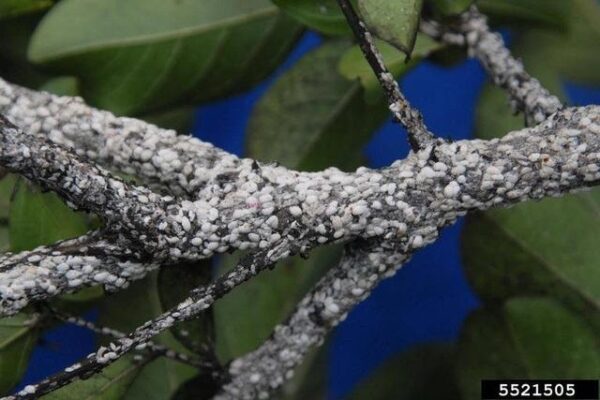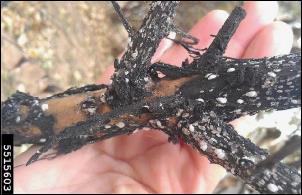Invasive pests (plants, insects, diseases, and others) cause enormous economic damage, as well as environmental damage. These displace or destroy beneficial and native plants and animals, reduce biodiversity. The annual economic cost is estimated at $1 billion in VA alone, more that $120 billion in the US.
If you think you see the following pest, which is not yet known to occur in Bedford County, please contact the Bedford Master Gardeners at bedfordmg@vt.edu or 540-586-7675. If you are outside of Bedford County, please contact your local Virginia Cooperative Extension Office.
Crapemyrtle Bark Scale (Acanthococcus lagerstroemiae)
This is a pinkish scale insect that produces a layer of whitish-gray waxy material that thickens as the scale matures. There are 2 generations per year. The crawlers are pink until they settle. Eggs hatch in the early spring, with a second hatch in mid-late summer. After the first molt, the nymphs become sessile. The males pupate and develop external wings during the last instar. Because the females do not disperse from the plant, these scales probably spread locally during the crawler stage via wind or birds. Long-distance transport most likely occurs when infested plant material is moved from one area to another.
Feeding by these insects decreases the size and abundance and of flowers, causing stunting and branch die back, and producing honeydew that grows black sooty mold. While first found in TX in 2004, it has spread throughout much of the southeastern US, including multiple locations in Virginia. It is originally from Asia (as is the crapemyrtle), and likely spreads through infested stock. While there are predatory ladybird beetles, they may not be present in high enough numbers to prevent damage.


Over time, these can result in plant death because of the severe stress on the crapemyrtle. This insect also has been found on American beautyberry (Callicarpa americana) and potentially could move to other trees and shrubs.
References (confirmed 3/16/2023)
Submitted by Betsy B., Bedford Cooperative Extension Master Gardener